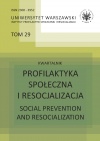Weber’s “Essential Paradox of Social Action”: What Can Sociology of the Unintended Learn from Public Policy Analysis?
Weber’s “Essential Paradox of Social Action”: What Can Sociology of the Unintended Learn from Public Policy Analysis?
Author(s): Adriana MicaSubject(s): Social Sciences
Published by: Instytut Profilaktyki Społecznej i Resocjalizacji UW
Keywords: sociology of the unintended; public policy of the unintended; Max Weber; paradox of rational ascetism; Sam Sieber; Albert O. Hirschman
Summary/Abstract: Within social sciences, the peculiarity of the sociological investigation of the unintended is the focus on paradoxical outcomes, and the analysis of these in relation to purposive social action. Although the analysis recurrently uses examples from public policy, if it comes to theory, the vocabulary employed speaks of contrarian and ironic effects of social action, or purposive social action, and not of social intervention. The inquiry thus arises: What can sociology of the unintended learn from public policy analysis? In order to answer this question, I look at framings and critical appraisal of Weber’s “essential paradox of social action” (Merton 1936) — i.e., the paradox of rational ascetism — in authors who are representative for sociology of the unintended and public policy of the unintended. The findings of the comparison and confrontation are synthesized in two main lessons for sociologists. The first stresses the need to include the structural and ideological circumstances in the analysis of paradoxes. The second indicates that the paradoxes are tricky because they might work as narrative sequences which have the tendency to focus the attention on the spectacular and ironic aspects of processes in the detriment of others.
Journal: Profilaktyka Społeczna i Resocjalizacja
- Issue Year: 2014
- Issue No: 23
- Page Range: 71-95
- Page Count: 25
- Language: English

